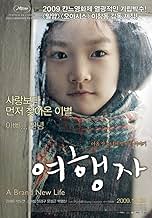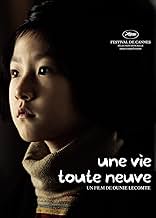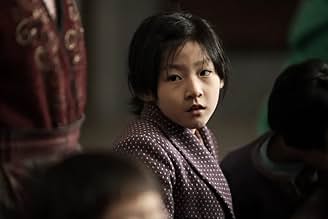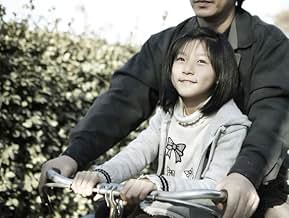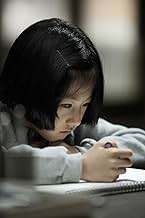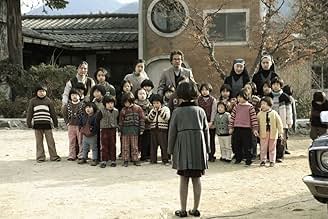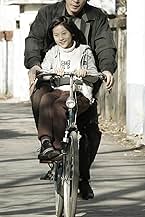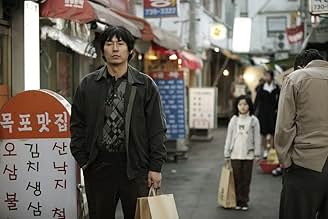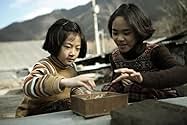Yeo-haeng-ja
- 2009
- 1h 32min
VALUTAZIONE IMDb
7,4/10
2661
LA TUA VALUTAZIONE
Aggiungi una trama nella tua linguaYoung Jinhee is taken by her father to an orphanage near Seoul. He leaves her there never to return, and she struggles to come to grips with her fate. Jinhee desperately believes her father ... Leggi tuttoYoung Jinhee is taken by her father to an orphanage near Seoul. He leaves her there never to return, and she struggles to come to grips with her fate. Jinhee desperately believes her father will come back for her.Young Jinhee is taken by her father to an orphanage near Seoul. He leaves her there never to return, and she struggles to come to grips with her fate. Jinhee desperately believes her father will come back for her.
- Regia
- Sceneggiatura
- Star
- Premi
- 11 vittorie e 2 candidature totali
Richard E. Wilson
- The American pupeteer
- (as Richard Wilson)
Recensioni in evidenza
In one review there is a comment to the effect of how sad it is that Koreans still dump unwanted children.
That person hasn't lived in a big enough world. Children worldwide, no matter which nation, suffer many types of abandonment and betrayal from those they consider to be their family, loved ones, carers.
And this is one type of story of such abandonment.
Sent to live in an orphanage with a view toward being adopted to a new family, most likely overseas into an entirely different culture, a little girl believes her father will always come back for her. But as so often happens and in some nations, yes, more than others, she is the unwanted child, the older child from another mother - and also a female, and father now has a new wife and a new baby - could I venture to guess, a boy?
The strikingly excellent acting from the young actress in the lead makes you believe you are seeing all those emotions and that searing pain of abandonment, from endless tears, disbelief, rage in reality, not just a movie.
She fights for herself, though. She doesn't give up although it appears she will. But from any child where the pain of abandonment and betrayal from those who you entrust to love and care for you, this film will resonate and possibly bring forward some real anxiety and memories that are unwanted. An excellent film very well done.
That person hasn't lived in a big enough world. Children worldwide, no matter which nation, suffer many types of abandonment and betrayal from those they consider to be their family, loved ones, carers.
And this is one type of story of such abandonment.
Sent to live in an orphanage with a view toward being adopted to a new family, most likely overseas into an entirely different culture, a little girl believes her father will always come back for her. But as so often happens and in some nations, yes, more than others, she is the unwanted child, the older child from another mother - and also a female, and father now has a new wife and a new baby - could I venture to guess, a boy?
The strikingly excellent acting from the young actress in the lead makes you believe you are seeing all those emotions and that searing pain of abandonment, from endless tears, disbelief, rage in reality, not just a movie.
She fights for herself, though. She doesn't give up although it appears she will. But from any child where the pain of abandonment and betrayal from those who you entrust to love and care for you, this film will resonate and possibly bring forward some real anxiety and memories that are unwanted. An excellent film very well done.
...yet I was left wanting for more. I didn't get to know much about Jinhee, why she was there, what happened to her family, and the like. Yet in real life, as this movie was based on, we often don't get the answers we seek or that would make sense of our situation. One reviewer said it wasn't a tearjerker but a heart tugger, and I tend to agree. The roles were beautifully played the child cast and a few cameos were nice by two of Korea's leading male actors who played Jinhee's father and a sympathetic doctor.
The sad thing is, Koreans still dump unwanted children into orphanages to this day, a lot of whom are the product of out-of-wedlock relationships. It's horrible to have the children suffer for the mistakes of adults.
The sad thing is, Koreans still dump unwanted children into orphanages to this day, a lot of whom are the product of out-of-wedlock relationships. It's horrible to have the children suffer for the mistakes of adults.
Winner of the Best Asian Film Award at last year's Tokyo International Film Festival, and screened out of competition at Cannes this year, writer-director Ounie Lecomte's debut feature film is a semi-autobiographical tale of a young South Korean girl who got abandoned by her single dad to an orphanage where she yearns a life of normalcy, still harbouring hopes that she'll be reunited with the only family she knows.
One can imagine just how much reference from Lecomte's own life got written into the film. Being unable to speak Korean and has French as a first language herself, Lecomte's tale follows the adventures of Jinhee (Kim Sae Ron), a precocious little girl who ends up in France which probably accounted for the director's own language skills or the lack thereof in her native tongue, and throughout the story you'll find it pretty heart-wrenching especially when Jinhee tries to resist blending into the scheme of things in the orphanage, knowing that to go with the flow will mean to surrender all memory of her loved one and life as she knew, to making herself appealing for a new foster family to pick her up for adoption.
Thus beneath the exterior sweetness lies strong feelings of resentment and anger even, being unable to fathom how her dad can give her up so that she can supposedly lead a better life in a foster home in the mid 70s Korea, and likely one to be overseas given the kind of folks who drop by the orphanage to look for children to adopt. The story's episodic in nature as the orphanage serves as a temporary holding point in her life in between a giant leap of change, and flits between how Jinhee finds every opportunity to resist change, and how each time she embraces a little change through friendships forged, her heart gets broken all over again.
And having one's heart broken too many times probably doesn't bode well for a proper, balanced development, given that her trust with loved ones and friends got betrayed in the highest order. The gem and revelation of the film is the tour de force performance by Kim Sae Ron as Jinhee, who almost single-handedly lifts the film from start to finish giving an unbelievably strong performance for her age, dealing with the range of positive and negative emotions like a seasoned veteran.
You can't help but to fall in love with the little girl, and share in her despair at being abandoned, and weep a little with her when promises made become shattered. Casting Sae Ron is a stroke of brilliance, as the actress' performance was key to make or break this film, and thankfully, she was the miracle to breathe life into what was a straightforward story dealing with human emotions, nevermind the bleak landscape that spelt doom and gloom. This performance alone is well worth getting a ticket to the film.
One can imagine just how much reference from Lecomte's own life got written into the film. Being unable to speak Korean and has French as a first language herself, Lecomte's tale follows the adventures of Jinhee (Kim Sae Ron), a precocious little girl who ends up in France which probably accounted for the director's own language skills or the lack thereof in her native tongue, and throughout the story you'll find it pretty heart-wrenching especially when Jinhee tries to resist blending into the scheme of things in the orphanage, knowing that to go with the flow will mean to surrender all memory of her loved one and life as she knew, to making herself appealing for a new foster family to pick her up for adoption.
Thus beneath the exterior sweetness lies strong feelings of resentment and anger even, being unable to fathom how her dad can give her up so that she can supposedly lead a better life in a foster home in the mid 70s Korea, and likely one to be overseas given the kind of folks who drop by the orphanage to look for children to adopt. The story's episodic in nature as the orphanage serves as a temporary holding point in her life in between a giant leap of change, and flits between how Jinhee finds every opportunity to resist change, and how each time she embraces a little change through friendships forged, her heart gets broken all over again.
And having one's heart broken too many times probably doesn't bode well for a proper, balanced development, given that her trust with loved ones and friends got betrayed in the highest order. The gem and revelation of the film is the tour de force performance by Kim Sae Ron as Jinhee, who almost single-handedly lifts the film from start to finish giving an unbelievably strong performance for her age, dealing with the range of positive and negative emotions like a seasoned veteran.
You can't help but to fall in love with the little girl, and share in her despair at being abandoned, and weep a little with her when promises made become shattered. Casting Sae Ron is a stroke of brilliance, as the actress' performance was key to make or break this film, and thankfully, she was the miracle to breathe life into what was a straightforward story dealing with human emotions, nevermind the bleak landscape that spelt doom and gloom. This performance alone is well worth getting a ticket to the film.
When I sat down here in 2022 to watch the 2009 South Korean drama "Yeo-haeng-ja" (aka "A Brand New Life"), then I had never heard about the movie before. So writer and director Ounie Lecomte had every opportunity to bedazzle and entertain me.
While I have no idea what life in an orphanage would be like in the 1970s South Korean, then I will say that writer and director Ounie Lecomte definitely managed to put together a rather emotional and beautiful movie here with "Yeo-haeng-ja".
But it was not only the writing and the storyline that made "Yeo-haeng-ja" a good movie. No, it was also very much because of some really amazing acting performances, especially by Kim Sae-Ron, Do Yeon Park and Ko Asung.
It should be noted that "Yeo-haeng-ja" is a slow paced movie, even for a drama. So it is a movie that might not find a base with just anyone in the audience, as it requires a particular mindset and mood to delve into the movie and enjoy it. There is just a sense of realism and sadness about the movie that permeates the entire movie, and it does creep in under the skin.
I will say, though, that I was adequately entertained by "Yeo-haeng-ja". However, it is not a movie that I will ever return to watch a second time around, as the storyline just doesn't have the contents to support a second viewing.
My rating of "Yeo-haeng-ja" lands on a six out of ten stars.
While I have no idea what life in an orphanage would be like in the 1970s South Korean, then I will say that writer and director Ounie Lecomte definitely managed to put together a rather emotional and beautiful movie here with "Yeo-haeng-ja".
But it was not only the writing and the storyline that made "Yeo-haeng-ja" a good movie. No, it was also very much because of some really amazing acting performances, especially by Kim Sae-Ron, Do Yeon Park and Ko Asung.
It should be noted that "Yeo-haeng-ja" is a slow paced movie, even for a drama. So it is a movie that might not find a base with just anyone in the audience, as it requires a particular mindset and mood to delve into the movie and enjoy it. There is just a sense of realism and sadness about the movie that permeates the entire movie, and it does creep in under the skin.
I will say, though, that I was adequately entertained by "Yeo-haeng-ja". However, it is not a movie that I will ever return to watch a second time around, as the storyline just doesn't have the contents to support a second viewing.
My rating of "Yeo-haeng-ja" lands on a six out of ten stars.
One of the greatest fears of childhood is being abandoned by your parents and left to face the world alone. In A Brand New Life, winner of Best Asian Film Award at the Tokyo International Film Festival, French director Ounie Lecomte recalls her childhood in South Korea with this sensitively rendered and touching story of a young girl who was left by her father in an all-girls Catholic orphanage to be placed for adoption. Set in Seoul in 1975, nine-year-old Jin-hee, superbly performed by Kim Sae-rom, does not suspect anything out of the ordinary after spending a day with her father (Sol Kyung-gu) buying new clothes, going out to dinner, and taking a ride together on his bicycle.
When Jin-hee is suddenly dropped off the next day at an orphanage just after her father bought her a cake that she picked out, she is bewildered but believes that her father will return to bring her home. Left to adjust to a strange new environment, however, she is full of anger. Though she is treated well by the nuns and the other children, she refuses to comply with the rules and resists the requests of sister Bomo (Park Myeong-shin), the woman who runs the orphanage. Refusing to speak, eat or change clothes, Jin-hee pleads with the director Koo (Oh Man-seok) to allow her to call her father but he is unable to find him. Planning to escape, she spends the night outside in the cold.
When she decides to return, she begins to reluctantly accept that her father will not return and that she will sooner or later be placed for adoption, perhaps with a family from another country. Fortunately, she finds a friend in 11-year-old Sook-hee (Park Do-yeon), a bright and outgoing girl who has learned to say the right things to prospective parents, but often causes trouble with the nuns. The two girls practice English together, play card games, sneak extra pieces of cake for each other, and care for a sick bird. Sook-hee tells her that she has started to have her period but she must keep it a secret. They talk about another girl Yeshin (Ko Ah-sung) who is depressed by a letter she receives from a boy (Mun Hack-jin) that she has a crush on.
Even though she is able to bond with Sook-hee, Jin-hee remains distressed about the lies her father told her, taking out her frustration by destroying Christmas dolls given to children as gifts, and refusing to answer questions at a meeting with perspective parents. A Brand New Life involves the heart but refuses to pull out all the dramatic stops to ratchet up the tears. Though its theme is downbeat, it is not a depressing film because the children are shown as having amazing strength and resilience. When each girl leaves with a new family and the remaining children sing "Auld Lang Syne," they are not just saying goodbye and lamenting the old times, but designing a brand new life for their friend and voicing hope as well for their own future.
When Jin-hee is suddenly dropped off the next day at an orphanage just after her father bought her a cake that she picked out, she is bewildered but believes that her father will return to bring her home. Left to adjust to a strange new environment, however, she is full of anger. Though she is treated well by the nuns and the other children, she refuses to comply with the rules and resists the requests of sister Bomo (Park Myeong-shin), the woman who runs the orphanage. Refusing to speak, eat or change clothes, Jin-hee pleads with the director Koo (Oh Man-seok) to allow her to call her father but he is unable to find him. Planning to escape, she spends the night outside in the cold.
When she decides to return, she begins to reluctantly accept that her father will not return and that she will sooner or later be placed for adoption, perhaps with a family from another country. Fortunately, she finds a friend in 11-year-old Sook-hee (Park Do-yeon), a bright and outgoing girl who has learned to say the right things to prospective parents, but often causes trouble with the nuns. The two girls practice English together, play card games, sneak extra pieces of cake for each other, and care for a sick bird. Sook-hee tells her that she has started to have her period but she must keep it a secret. They talk about another girl Yeshin (Ko Ah-sung) who is depressed by a letter she receives from a boy (Mun Hack-jin) that she has a crush on.
Even though she is able to bond with Sook-hee, Jin-hee remains distressed about the lies her father told her, taking out her frustration by destroying Christmas dolls given to children as gifts, and refusing to answer questions at a meeting with perspective parents. A Brand New Life involves the heart but refuses to pull out all the dramatic stops to ratchet up the tears. Though its theme is downbeat, it is not a depressing film because the children are shown as having amazing strength and resilience. When each girl leaves with a new family and the remaining children sing "Auld Lang Syne," they are not just saying goodbye and lamenting the old times, but designing a brand new life for their friend and voicing hope as well for their own future.
I più visti
Accedi per valutare e creare un elenco di titoli salvati per ottenere consigli personalizzati
- How long is A Brand New Life?Powered by Alexa
Dettagli
Botteghino
- Lordo in tutto il mondo
- 169.277 USD
Contribuisci a questa pagina
Suggerisci una modifica o aggiungi i contenuti mancanti

Divario superiore
By what name was Yeo-haeng-ja (2009) officially released in India in English?
Rispondi
